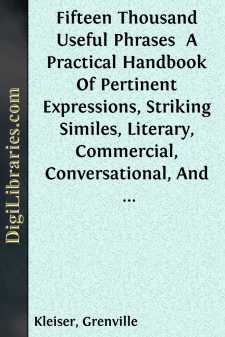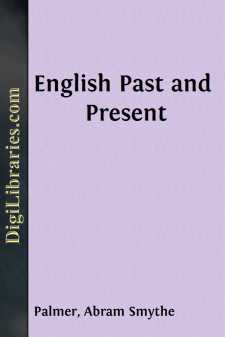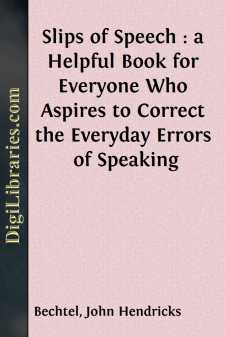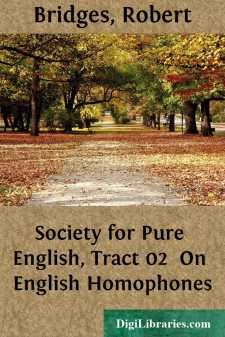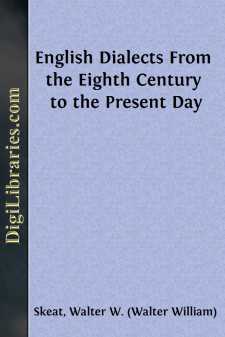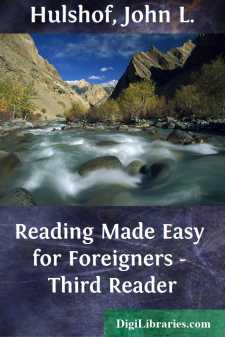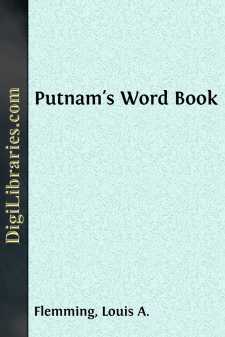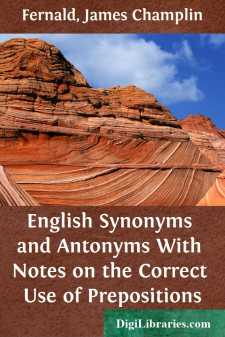Language Arts & Disciplines
- Alphabet 2
- Authorship 5
- Composition & Creative Writing 2
- Etymology 4
- General
- Grammar 18
- Journalism 3
- Phonetics & Phonics 1
- Public Speaking 1
- Readers 2
- Reading Skills 1
- Rhetoric 8
- Semantics 1
- Spelling 2
- Study & Teaching 3
- Translating & Interpreting 2
- Vocabulary 5
General Books
Sort by:
INTRODUCTION The most powerful and the most perfect expression of thought and feeling through the medium of oral language must be traced to the mastery of words. Nothing is better suited to lead speakers and readers of English into an easy control of this language than the command of the phrase that perfectly expresses the thought. Every speaker's aim is to be heard and understood. A clear, crisp...
more...
ENGLISH A COMPOSITE LANGUAGE “A very slight acquaintance with the history of our own language will teach us that the speech of Chaucer’s age is not the speech of Skelton’s, that there is a great difference between the language under Elizabeth and that under Charles the First, between that under Charles the First and Charles the Second, between that under Charles the Second and Queen Anne; that...
more...
Lau is the name given to the language spoken by the inhabitants of the artificial islets which lie off the northeast coast of Big Malaita, Solomon Islands. The language spoken on the coast from Uru on the northeast to Langalanga, Alite Harbor, on the northwest of Big Malaita, is practically Lau. On the west coast there is considerable admixture of Fiu, which is the language of the bush behind the...
more...
by:
Edward Sapir
I Introductory: Language Defined Speech is so familiar a feature of daily life that we rarely pause to define it. It seems as natural to man as walking, and only less so than breathing. Yet it needs but a moment’s reflection to convince us that this naturalness of speech is but an illusory feeling. The process of acquiring speech is, in sober fact, an utterly different sort of thing from the process...
more...
I shall read, We shall read,You will read, You will read,He will read, They will read. But when I desire to show determination on my part to do a certain thing, or when I exercise my authority over another, or express promise, command, or threat, will is used in the first person and shall in the second and third; as, I will read, We will read,You shall read, You shall read,He shall read, They shall...
more...
by:
Robert Bridges
ENGLISH HOMOPHONES Definition of homophone. When two or more words different in origin and signification are pronounced alike, whether they are alike or not in their spelling, they are said to be homophonous, or homophones of each other. Such words if spoken without context are of ambiguous signification. Homophone is strictly a relative term, but it is convenient to use it absolutely, and to call any...
more...
CHAPTER I DIALECTS AND THEIR VALUE According to the New English Dictionary, the oldest sense, in English, of the word dialect was simply “a manner of speaking” or “phraseology,” in accordance with its derivation from the Greek dialectos, a discourse or way of speaking; from the verb dialegesthai, to discourse or converse. The modern meaning is somewhat more precise. In relation to a language...
more...
by:
John L. Hulshof
LESSON I FLAG DAY In this fair land of ours you can see the Stars and Stripes floating over every public school. This beautiful flag stands for our country. Every American is proud of his country's flag. It stands for all that is good and dear to an American. It stands for Liberty. It proclaims liberty to all. Every star stands for liberty. Every stripe stands for liberty. It stands for liberty of...
more...
Preface The purpose of this book, as conceived by the author, is not to attempt to create or to influence usage by pointing out which words should or should not be used, nor to explain the meaning of terms, but simply to provide in a form convenient for reference and study the words that can be used, leaving it to those who consult its pages to determine for themselves, with the aid of a dictionary if...
more...
PREFACE. The English language is peculiarly rich in synonyms, as, with such a history, it could not fail to be. From the time of Julius Cæsar, Britons, Romans, Northmen, Saxons, Danes, and Normans fighting, fortifying, and settling upon the soil of England, with Scotch and Irish contending for mastery or existence across the mountain border and the Channel, and all fenced in together by the sea, could...
more...


